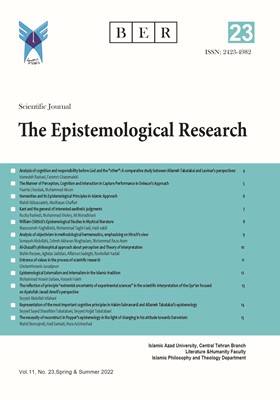-
-
List of Articles
-
Open Access Article
1 - Analysis of cognition and responsibility before God and the "other" : A comparative study between Allameh Tabatabai and Levinas’s perspectives
Hamede Rastaei Ahad Faramarz Qramaleki -
Open Access Article
2 - The Manner of Perception, Cognition and Interaction in Capture Performance in Deleuze’s Approach
Paria Choubak mohammadM Akvan -
Open Access Article
3 - Humanities and Its Epistemological Principles in Islamic Approach
Mahdi Abbaszadeh Abolhasan Ghaffari -
Open Access Article
4 - Kant and the general of interested- aesthetic judgments
ًRozita Rashedi Mohammad Shokry Ali Moradkhani -
Open Access Article
5 - William Chittick's Epistemological Studies In Mystical literature
Massoumeh Naghdebishi Mohammad Taghi Faali hadi vakili -
Open Access Article
6 - An Analysis of objectivism in methodological hermeneutics, emphasizing on Hirsch's view
somayeh abdollahi zohreh akhavan moghadam Mohamad Reza Aram -
Open Access Article
7 - Al-Ghazali's philosophical approach on perception and Theory of interpretation
mahin rezaee aghdas jadidian aflatoun sadeghi roohollah nadali -
Open Access Article
8 - Entrance of values in the process of scientific research
GholamHossein Javadpoor -
Open Access Article
9 - epistemological Externalism and Internalism in the Islamic tradition
mohammad hosein safaee hosein valeh -
Open Access Article
10 - The reflection of principle “extremist uncertainty of experimental sciences” in the scientific interpretation of the Qur'an focused on Ayatollah Javadi Amoli’s perspective
Seyyed Abdollah Isfahani -
Open Access Article
11 - Representation of the most important cognitive principles in Hakim Suhrawardi and Allameh Tabatabai’s epistemology
Seyed sayed sharafoden tabatabaei sayyed hojjat tabatabaei -
Open Access Article
12 - The necessity of reconstruct in Popper's epistemology in the light of changing in his attitude towards Darwinism
mahdi boroujerdi Hadi Samadi Reza Azizinezhad
-
The rights to this website are owned by the Raimag Press Management System.
Copyright © 2021-2025







